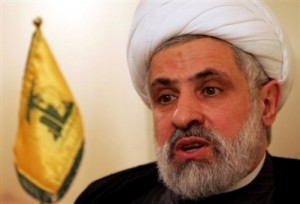
Hezbollah’s deputy chief said Monday his group is not interested in a dialogue with Washington until the U.S. changes its Mideast policy, which he said is totally biased in favor of Israel.
Sheik Naim Kassem was responding to leading U.S. expert on the Middle East Ryan Crocker who told Congress earlier this month the United States should break with long-standing policy and start talking to the Iranian-backed group.
Crocker, who retired from the foreign service last year as the State Department’s most experienced Mideast hand, told a Senate hearing that the United States stands to gain more than it would lose by negotiating with Hezbollah, which the U.S. government classifies as a terrorist organization.
The Obama administration, however, appeared unwilling to change course. Jeffrey Feltman, the State Department’s chief Mideast official, told the same Senate Foreign Relations Committee hearing: “Our policy is nonengagement with Hezbollah, for all the reasons you know, and I don’t anticipate that policy changing.”
Feltman said the United States might reconsider its policy if Hezbollah became “a normal part of the political fabric” in Lebanon. He added that as long as Hezbollah maintains a militia and “is undertaking activities in the region and beyond that basically are terrorist activities, we’re not engaging with them,” Feltman said.
Hezbollah has been known for its anti-U.S. stance since the group was created in 1982 after Israel invaded Lebanon. The group says its weapons are needed to face any future Israeli attack.
“There is an American behavior that has to change first, and then we can discuss the possibility of a dialogue,” Kassem told The Associated Press from a secret location in the group’s southern Beirut stronghold of Dahiyeh. The AP team was taken to Kassem’s office in a Hezbollah van with drawn black curtains.
“America is playing the role of troublemaker in the region,” said the white-turbaned cleric in an apparent reference to the U.S. invasion of Iraq and Afghanistan.
Washington blames Hezbollah for the explosion that killed 241 U.S. military personnel at the Marines’ Beirut airport base in 1983, as well as for two attacks on the U.S. Embassy in Beirut and the 1985 TWA hijacking that killed an American serviceman on board.
Those attacks were blamed on pro-Iranian Shiite Muslim militants.
But since the 1990s, Hezbollah has denied links to the attacks, insisting it opposes terrorism and its fight is only with Israel. The group is represented in parliament and the Cabinet, but still has a powerful military wing that fought Israel in the 2006 war.
Kassem also said he does not expect a war with Israel, but the group is preparing for it “as if it is happening tomorrow.”
Israel and Hezbollah have exchanged threats in recent months and many in Lebanon feared a new round of fighting. The summer 2006 war, which left some 1,200 Lebanese and 160 Israelis dead, ended in a stalemate.
Tensions have also risen in recent weeks after Israel accused Syria of smuggling Scuds and other types of missiles to Hezbollah. Syria denied the charge.
Israeli officials have said they believe Hezbollah has managed to triple its prewar arms stockpile to more than 40,000 rockets some of which can hit anywhere in Israel.
Kassem declined to discuss the group’s arms arsenal and whether the group had acquired long-range Scud missiles, saying Hezbollah’s strength was in the “secrecy” with which it conducts its military operations.
Kassem said “the balance of terror” that Hezbollah has achieved with Israel as well as its “devastating defeat” during the 2006 war have made Israel think twice about any future attack on Lebanon.
He said however that the party was highly prepared and ready “at any time” to fight Israel.AP

Leave a Reply
You must be logged in to post a comment.